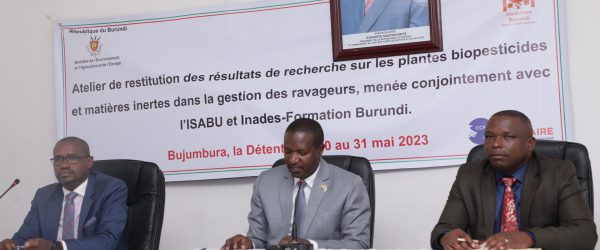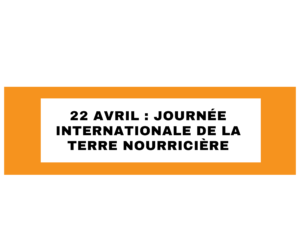Within the framework of the promotion of the right to healthy, sufficient and sustainable food, a research-action on biopesticide plants and inert materials in the management of raters has just been carried out by Inades-Formation Burundi in collaboration with the Ministry of the Environment, Agriculture and Livestock (MINEAGRIE) through the Institut des Sciences Agronomiques du Burundi (ISABU). 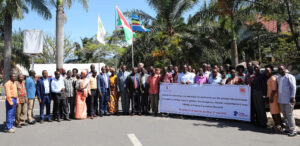 Under the high patronage of MINEAGRIE, represented by the Director General of Planning, Environment, Agriculture and Livestock, Honorable Emmanuel NIYUNGEKO, the workshop was attended by various categories of participants: General Managers; Directors of various departments; ISABU researchers; Universities; professors responsible for various key research centers; international and national NGOs; CSOs; representatives of agricultural producers through Inades-Formation Burundi and the media.
Under the high patronage of MINEAGRIE, represented by the Director General of Planning, Environment, Agriculture and Livestock, Honorable Emmanuel NIYUNGEKO, the workshop was attended by various categories of participants: General Managers; Directors of various departments; ISABU researchers; Universities; professors responsible for various key research centers; international and national NGOs; CSOs; representatives of agricultural producers through Inades-Formation Burundi and the media.
In his opening remarks, the Director of Inades-Formation Burundi outlined the institution’s history in promoting sustainable food systems since 2013. He detailed a number of achievements that demonstrate his experience in this field. He informed the audience that this research began in 2019 with nationwide identification of pesticidal plants and their categorization by agricultural producer users. Hence, the conduct of this action research by the researchers
practitioners and those of ISABU for two years to test the effectiveness of pesticidal plants and other inert materials in the management of fall armyworm and post-harvest insects of maize and bean grains. Finally, he thanked CCFD-Terre Solidaire for its financial support.
At the opening ceremony, the delegate of the Minister of the Environment, Agriculture and Livestock, who is responsible for agriculture, expressed his gratitude to all those involved in promoting biopesticides, including Inades-Formation Burundi. 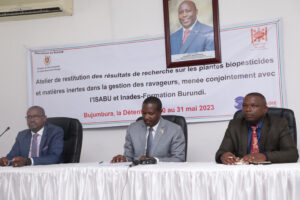 He noted that the massive use of insecticides has generally been observed since the invasion of corn fields by the fall armyworm, whereas this major crop used to be produced without synthetic chemical pesticides. The same applies to weevils and bean leaf bruchids, which require specific means of protection. The massive use of pesticides in the national context presents many risks, notably environmental pollution and exposure of users and consumers. There is an urgent need for alternatives, as some farmers are not even able to buy these pesticides when they need them.
He noted that the massive use of insecticides has generally been observed since the invasion of corn fields by the fall armyworm, whereas this major crop used to be produced without synthetic chemical pesticides. The same applies to weevils and bean leaf bruchids, which require specific means of protection. The massive use of pesticides in the national context presents many risks, notably environmental pollution and exposure of users and consumers. There is an urgent need for alternatives, as some farmers are not even able to buy these pesticides when they need them.
The results of the workshop are very satisfactory. Research and testimonials have demonstrated the effectiveness of Tithonia diversifolia, Azadirachta indica and Melia azedirach plants in managing armyworm on maize crops. The same applies to inert materials such as laterite, palm oil, limestone, kaolin and the tuber of Discorea spp. against stock pests, maize weevils and bean bruchids. 12 producers actively participated in the whole process. The growers have made their plots available for trials and the necessary equipment. 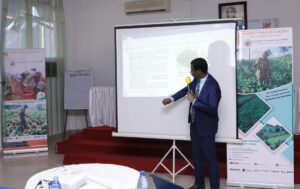 ISABU, for its part, provided the expertise and complementary equipment needed to carry out this research. She also collected, processed and analyzed the results. The trials were set up at the Mparambo and Murongwe research stations and at ISABU headquarters, as well as at the homes of twelve farmers in 7 communes: Ndava, Giheta, Kirundo, Bugabira, Ntega, Buganda and Rugombo).
ISABU, for its part, provided the expertise and complementary equipment needed to carry out this research. She also collected, processed and analyzed the results. The trials were set up at the Mparambo and Murongwe research stations and at ISABU headquarters, as well as at the homes of twelve farmers in 7 communes: Ndava, Giheta, Kirundo, Bugabira, Ntega, Buganda and Rugombo).
To make it easier to disseminate the results nationwide, 5 technical data sheets have been validated (1), the Neem (Azadirachta indica and Melia azedirach) against the armyworm (2), the use sheet for neem powder extracts (Melia azedirach) in the management of armyworm (3), the tithonia (Tithonia diversifolia) in the management of Fall armyworm (4),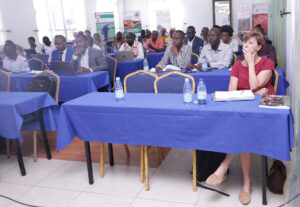 the use of laterite, kaolin, limestone and palm oil in the management of bean bruchids in stock (6), the use of laterite, kaolin, limestone and palm oil in the management of weevils in stock.
the use of laterite, kaolin, limestone and palm oil in the management of bean bruchids in stock (6), the use of laterite, kaolin, limestone and palm oil in the management of weevils in stock.
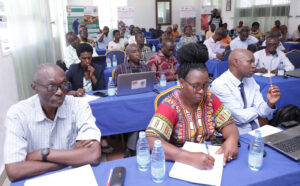
Finally, participants were unanimous that agricultural producers are essential researchers for the reliability of results, hence the quality of the results obtained. Highly interested in this research work by Inades-Formation Burundi for the 1st time in Burundi, the audience was keen to find out more about this subject, which forms part of the implementation of the Conscience AlimenTERRE campaign to safeguard human life. They all gave their support to Inades-Formation Burundi for this project.
Advertorial on YouTube:
https://www.youtube.com/watch?v=Oxay63C30C0
Published by Richard HAVYARIMANA
Advocacy and Communication Officer

